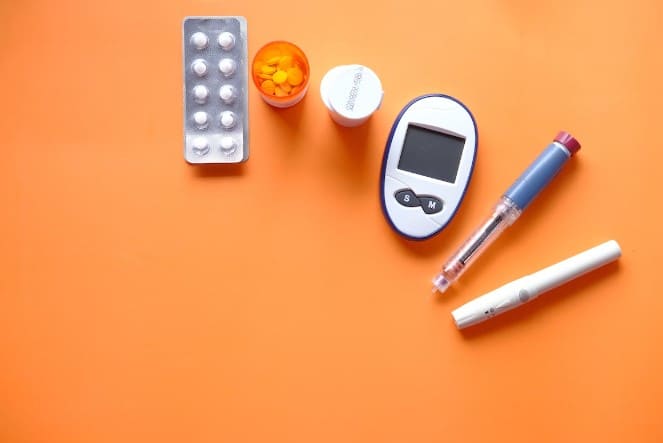fbq('trackCustom', 'view_shop_coffee'); var trackEvent = 'shop_coffee'; Well, well, well. So, you just ordered a double…
Can people with diabetes drink coffee? This is a question that many people have. The answer is yes, but you need to be careful. Coffee can have a positive or negative effect on blood sugar levels, depending on how it is prepared and consumed. In this blog post, we will discuss the effects of caffeine and coffee on diabetes. We will also provide tips for drinking coffee safely while living with diabetes.

When drinking coffee while living with diabetes, it is important to make sure you have the right supplies on you. These diabetic supplies will help you manage your blood sugar levels and avoid any potential problems. You should always have a glucose meter, test strips, and insulin or other medications readily available when drinking coffee. If you are planning to spend time in a café or restaurant, make sure you have a snack available in case your blood sugar drops.
Additionally, it is important to monitor your glucose levels before and after drinking caffeine so that you can adjust your medication accordingly. By taking these precautions, you will be able to enjoy the occasional cup of coffee without fear of an adverse reaction.
Coffee has long been celebrated for its potential health benefits, many of which are backed by scientific research. Studies have linked coffee intake to improved heart health, a lower risk of type 2 diabetes and liver disease, improved mental alertness and concentration, and even a decreased risk of certain cancers. However, when it comes to people with diabetes, the effects of caffeine and coffee consumption can be more complicated.
Caffeine is a stimulant that has been shown to raise blood glucose levels, so people with diabetes should take care when considering coffee consumption. Additionally, many commercial coffee drinks contain added sugars and high-calorie syrups that may not fit within a healthy diabetic eating plan. Therefore, it is important for people with diabetes to carefully consider the benefits and risks of drinking coffee.
Ultimately, moderate consumption of plain black coffee appears to be safe for many diabetics – but as always with health decisions, consulting a doctor is recommended before making any changes in diet or caffeine intake.
Caffeine is a stimulant that can have an effect on blood sugar and insulin. Studies have indicated that caffeine can raise blood sugar levels, as well as increase the need for insulin in people with diabetes. Furthermore, larger doses of caffeine can lead to greater spikes in blood sugar levels, so it’s important that those with diabetes monitor their blood sugar closely when consuming caffeine.
Additionally, caffeine can increase the release of hormones that are associated with insulin resistance, so people with diabetes should be mindful of their overall caffeine intake. However, in moderate amounts, coffee can still be a part of a healthy diet for those with diabetes.

Caffeine is a stimulant found in coffee, tea, energy drinks, and cocoa. For people with diabetes, it is important to monitor the amount of caffeine they consume each day. Too much caffeine can lead to symptoms such as insomnia, restlessness, irritability, nervousness, and increased heart rate. People with diabetes should limit the amount of caffeine they consume to less than 400 milligrams per day.
A cup of coffee contains between 75 and 120 milligrams, so it is important to be mindful when consuming multiple cups throughout the day. Additionally, people with diabetes should be aware that sugary energy drinks may contain large amounts of caffeine and sugar which can increase blood sugar levels and cause other health issues. It is best to consult with a doctor before consuming any caffeinated beverages while having diabetes.
Caffeine can also influence diabetes in terms of physical activity. For people with diabetes, exercise is an important part of managing their condition. Caffeine can both improve and hinder physical performance. On one hand, caffeine can enhance energy levels and alertness which may result in improved athletic endurance, aerobic performance, and strength during workouts. However, too much caffeine can cause dehydration and electrolyte imbalances which may lead to decreased performance.
People with diabetes should therefore be mindful of their caffeine intake before, during, and after exercise in order to ensure that both their blood sugar levels and physical activity are unaffected by their coffee consumption. Ultimately, it is important for people with diabetes to make informed decisions about their caffeine intake in order to ensure they get the most out of their exercise routine.
Coffee is a popular beverage for many people, but if you have diabetes, you may be wondering if it’s safe to consume. While coffee does contain caffeine, there’s no evidence that suggests drinking it is harmful to diabetics. In fact, numerous studies have suggested that moderate consumption of coffee can even help lower the risk of type 2 diabetes. However, since coffee still contains sugar and calories, it’s essential to drink it in moderation and practice mindful eating habits when enjoying a cup.
Additionally, individuals with diabetes should take care not to add cream or sugar to their coffee as this will increase the calorie content and may lead to an unhealthy spike in their blood sugar levels. Overall, drinking coffee in moderation is likely safe for individuals with diabetes and may even provide some health benefits. It’s important to be mindful of how much you consume as well as what type of milk or sweeteners are added to the beverage.
In the event of a diabetic emergency, it is important to call 911 or another emergency services number immediately. It is also important to check the patient’s blood sugar levels and administer insulin if needed. Additionally, people with diabetes should always keep an emergency diabetes kit on hand which includes things like glucose tablets, glucose gel, glucagon injection, and extra snacks.
It is important to know how to administer the treatments in the kit and when they should be used. Finally, people with diabetes should always carry their medical identification card with them at all times in case of an emergency. With these precautions in mind, individuals with diabetes can feel more prepared for any potential emergencies.
In conclusion, people with diabetes can safely drink coffee as long as they practice moderation and mindful eating habits. Drinking coffee may even provide some health benefits for those with diabetes. However, it is important to be aware of the potential risks associated with excessive caffeine intake such as dehydration, electrolyte imbalance, or an unhealthy spike in blood sugar levels. It is also essential to keep an emergency diabetes kit on hand and to know how to administer its treatments in the event of a diabetic emergency. Ultimately, people with diabetes should consult their doctor before consuming any caffeinated beverages in order to ensure their safety and well-being.